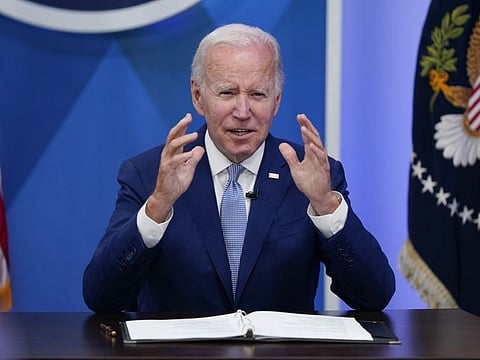Biden set to tackle oil, Israel, Yemen, Iran on Saudi trip
US president is also due to attend a summit of Gulf Arab leaders

Dubai: President Joe Biden will visit the United State’s most important Arab ally Saudi Arabia on July 16 after two years of strained ties over the killing of Washington Post journalist Jamal Khashoggi and the war in Yemen.
Here are key issues between the United States and Saudi Arabia that could arise in talks involving Biden and King Salman bin Abdul Aziz and Crown Prince Mohammad bin Salman.
OIL SUPPLIES: Washington’s desire to improve ties to Gulf states has become more urgent following Russia-Ukraine conflict. The Ukraine war highlighted the relevance of Gulf oil producers as Biden struggles to combat high US gasoline prices and build a united international front to isolate Russia.
Biden is also due to attend a summit of Gulf Arab leaders. Biden has called on the kingdom and other Gulf producers to raise oil output to help stabilise prices, which have surged as a result of a strong rebound in consumption from pandemic-induced lows and now sanctions on Russia.
Biden said last month he would not directly press Saudi Arabia to increase oil output on his visit.
ARAB-ISRAEL BLOC: Biden is likely to encourage Saudi Arabia to establish ties with Israel.
Washington hopes more cooperation would further integrate Israel in the region. It may also preface more normalisation between Israel and other Gulf states.
Riyadh was supportive of Israel’s rapprochement with the UAE and Bahrain in the US-brokered Abraham Accords of 2020. But Saudi Arabia stopped short of itself normalising ties to Israel.
Saudi Arabia, home to Islam’s holiest two sites, has conditioned any eventual normalisation on the addressing of the Palestinians’ quest for statehood on territory captured by Israel in the 1967 Middle East war.
Biden will help Israel strengthen its regional ties and take its US alliance to new heights on his Middle East trip, Israeli Prime Minister Naftali Bennett’s office said in June.
YEMEN WAR: Both sides agreed in April on a UN ceasefire proposal that has suspended air, sea and land attacks while allowing imports into Houthi-controlled sea ports and a partial reopening of Sana’a airport. The truce is the first comprehensive agreement in the war, which has killed tens of thousands and pushed Yemen to the brink of famine.
Biden is likely to ask Riyadh to keep up its support for the truce. In June the White House took the rare step of recognising the role played by MbS in extending a ceasefire in Yemen.
IRAN: Saudi Arabia has long been wary of efforts to revive Iran’s 2015 nuclear deal with world powers, which gave Tehran sanctions relief in exchange for curbs on Iran’s nuclear programme. Talks on resurrecting the accord have been stalled for months.
Mohammad bin Salman is likely to raise his concerns. Riyadh had criticised the 2015 pact as flawed for not addressing Tehran’s missile programme and network of regional allies, a key concern for some Gulf states.
Sign up for the Daily Briefing
Get the latest news and updates straight to your inbox






